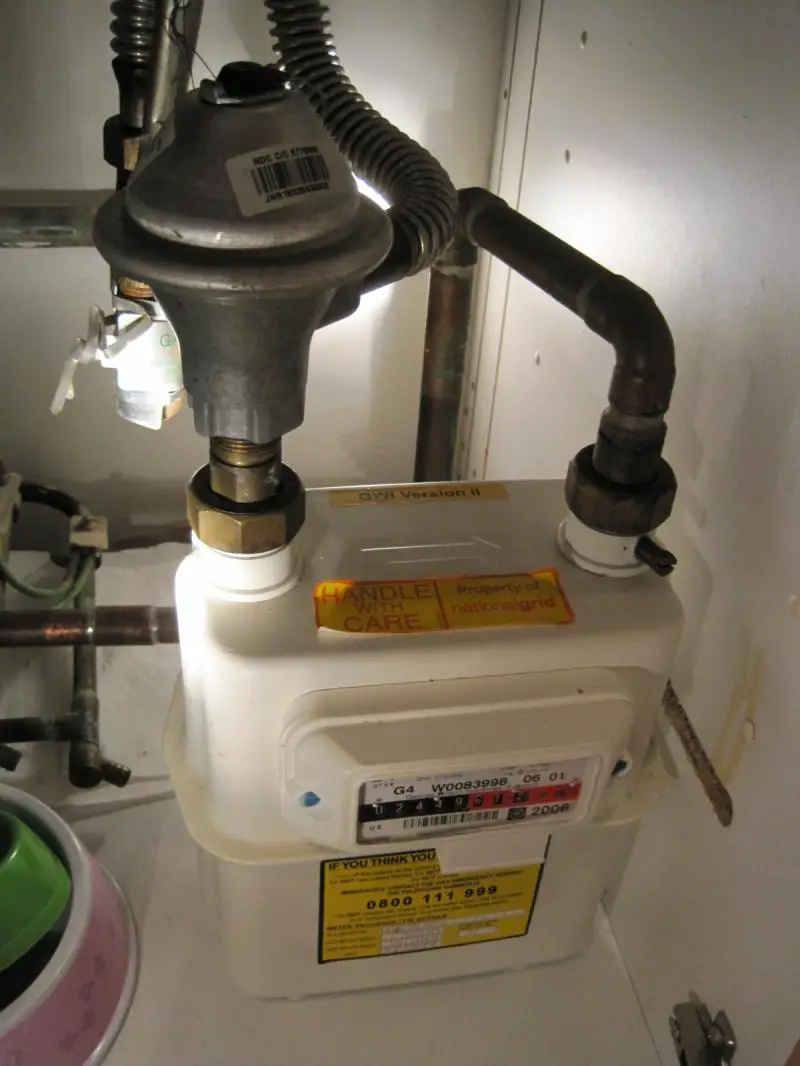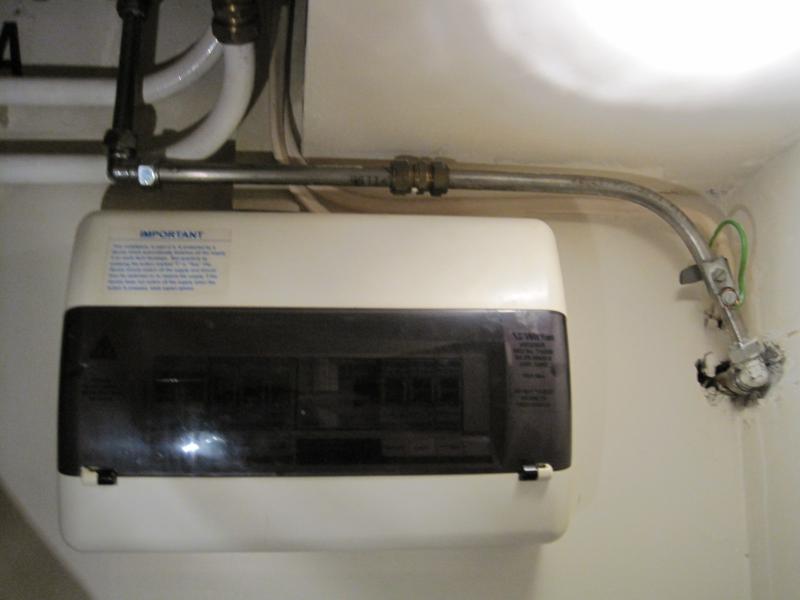You are using an out of date browser. It may not display this or other websites correctly.
You should upgrade or use an alternative browser.
You should upgrade or use an alternative browser.
green and yellow cable under the sink
- Thread starter Lisarubysmumx
- Start date
Sponsored Links
what pipes ???
Sponsored Links
Don't think you have anything to worry about. You should probably trust the opinion of your electrician, not an internet forum 
omg i have only just noticed them pipes above that fuse box 
is that safe ???????????
this is a private rented place its not mine
is that safe ???????????
this is a private rented place its not mine
OK, in this picture
I can see the pipe on the right hand side of the gas meter, should have a main bonding clamp on it, but hasn't
In this picture, I can see a bonding clamp on the silver pipe. I don't know if it's gas or water. I can see a clamp and a G&Y on it, but I can't see where the G&Y goes - possibly through the wall, possibly it is just cut off and folded back.
There is only one cable visible that seems to go into the consumer unit, so there are certain to be some going into it from behind, probably coming through the wall. Do you know what is on the other side of this wall?
It is certainly beginning to look like there is no main bonding of the gas pipe, and we have not yet seen main bonding of the water pipe. The person who cut off the "spare" bit of wire may have been correct if he said it was not doing anything, but that does not mean that main bonding is in place, and so far it looks like it isn't.
I can see the pipe on the right hand side of the gas meter, should have a main bonding clamp on it, but hasn't
In this picture, I can see a bonding clamp on the silver pipe. I don't know if it's gas or water. I can see a clamp and a G&Y on it, but I can't see where the G&Y goes - possibly through the wall, possibly it is just cut off and folded back.
There is only one cable visible that seems to go into the consumer unit, so there are certain to be some going into it from behind, probably coming through the wall. Do you know what is on the other side of this wall?
It is certainly beginning to look like there is no main bonding of the gas pipe, and we have not yet seen main bonding of the water pipe. The person who cut off the "spare" bit of wire may have been correct if he said it was not doing anything, but that does not mean that main bonding is in place, and so far it looks like it isn't.
the purpose of main bonding is to ensure that all the metallic services coming into the house are at the same potential as the house electrical earth.
For example, if you have an electric kettle, it will be connected to the earth wire of the electrical system through the earth pin of the plug. If you have the kettle in one hand, and the cold tap in the other, the bonding should ensure that you cannot get a shock even if the kettle is faulty, because there will be no voltage between them. Even in the very unlikely event of the water or gas pipe becoming live, for example if a tree is blown over and a power line falls on a gas pipe outside, you should not get a shock even if you touch e.g. the gas boiler or cooker at the same time as the electric kettle or a metal light switch.
So it is a basic and important safety feature that has been required in electrical installations for many years.
AFAIK there is no legal requirement for landlords to have electrical safety regularly inspected. However a good ploy is to write a letter (not make a phone call) to the agent saying that an electrician friend commented that he could not see any evidence of main bonding on the gas and water services, and can they confirm that the electrical installation is safe and up to standard please. This tends to frighten them, because if they say it is, and you are later electrocuted, they will be in a difficult position. So there is a good chance that after they have tried to weasel out of it, you can get them to pay an electrician to inspect, test, and if necessary rectify it. Main bonding in a small flat is unlikely to be as much as half a day's work, it might only take an hour or so. If they send anyone, ask them to confirm that he is a qualified electrician who is a member of a self-certification scheme (although this is not strictly necessary, if they employ an unqualified handyman and he doesn't do a proper job, they will, again, be in a difficult position if you are later electrocuted). Your trick is to make sure they can't say they didn't know. It is, of course, very unlikely that you actually will be electrocuted, but it does no harm to make them observe elementary safety rules.
For example, if you have an electric kettle, it will be connected to the earth wire of the electrical system through the earth pin of the plug. If you have the kettle in one hand, and the cold tap in the other, the bonding should ensure that you cannot get a shock even if the kettle is faulty, because there will be no voltage between them. Even in the very unlikely event of the water or gas pipe becoming live, for example if a tree is blown over and a power line falls on a gas pipe outside, you should not get a shock even if you touch e.g. the gas boiler or cooker at the same time as the electric kettle or a metal light switch.
So it is a basic and important safety feature that has been required in electrical installations for many years.
AFAIK there is no legal requirement for landlords to have electrical safety regularly inspected. However a good ploy is to write a letter (not make a phone call) to the agent saying that an electrician friend commented that he could not see any evidence of main bonding on the gas and water services, and can they confirm that the electrical installation is safe and up to standard please. This tends to frighten them, because if they say it is, and you are later electrocuted, they will be in a difficult position. So there is a good chance that after they have tried to weasel out of it, you can get them to pay an electrician to inspect, test, and if necessary rectify it. Main bonding in a small flat is unlikely to be as much as half a day's work, it might only take an hour or so. If they send anyone, ask them to confirm that he is a qualified electrician who is a member of a self-certification scheme (although this is not strictly necessary, if they employ an unqualified handyman and he doesn't do a proper job, they will, again, be in a difficult position if you are later electrocuted). Your trick is to make sure they can't say they didn't know. It is, of course, very unlikely that you actually will be electrocuted, but it does no harm to make them observe elementary safety rules.
John , do you know if there is anyone who provides a free homecheck safety check please ? so i could get this place checked out ??
I see you are in Hampshire. if your electricity is supplied by Southern Electric, I happen to know that they offer free electrical checks. This is only at a very basic level, they just walk in and have a look round, it will probably not even be a qualified electrician, but he ought to check for main bonding because it is so elementary. They do it because they hope to get the profitable work of correcting any defects. Any independent electrician who does free checks will do it for the same reason, and might charge rather high later, but SSE have a good reputation and I consider them trustworthy.
I don't know if it more complicated with a rental property.
I don't know if it more complicated with a rental property.
i have just signed up for a plan where you pay 4pound a month and you get a free check , and free telephone advice etc ,ive told them what i want checkin ,ie if the place is main bonded and if that fuse box is safe sitting under water pipes , i have to wait at least 14days though till i get an appointment

DIYnot Local
Staff member
If you need to find a tradesperson to get your job done, please try our local search below, or if you are doing it yourself you can find suppliers local to you.
Select the supplier or trade you require, enter your location to begin your search.
Please select a service and enter a location to continue...
Are you a trade or supplier? You can create your listing free at DIYnot Local
Sponsored Links
Similar threads
- Replies
- 19
- Views
- 16K
- Replies
- 19
- Views
- 3K





